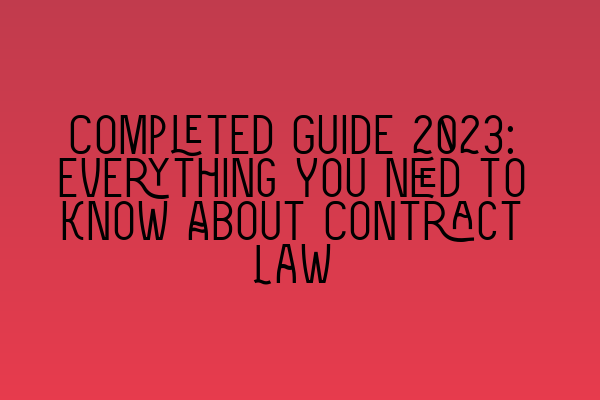Complete Guide 2023: Everything You Need to Know About Contract Law
Welcome to the Complete Guide 2023! In this comprehensive blog post, we will cover everything you need to know about contract law. Whether you’re an aspiring solicitor, a business owner, or simply interested in understanding the legal complexities of contracts, this guide is for you. So, let’s dive right in!
What is Contract Law?
Contract law is the area of law that governs agreements between two or more parties. A contract is a legally binding agreement that outlines the rights and obligations of each party involved. It can cover various aspects, such as the sale of goods, provision of services, employment agreements, and more.
Understanding contract law is essential for individuals and businesses as contracts are a fundamental part of everyday life. From buying a house to signing an employment contract, contracts play a crucial role in securing legal relationships and protecting the rights of all parties involved.
Key Concepts in Contract Law
To grasp the intricacies of contract law, it’s important to familiarize yourself with some key concepts:
Offer and Acceptance
An offer is a proposal made by one party to another, indicating their willingness to enter into a contract. Acceptance occurs when the second party agrees to the terms of the offer, thereby forming a legally binding agreement.
Consideration
Consideration refers to something of value exchanged between the parties as part of the contract. It can be in the form of money, goods, services, or a promise to do or not do something. Consideration ensures that both parties have mutually agreed to be bound by the contract.
Intention to Create Legal Relations
In contract law, parties must have a genuine intention to enter into a legally binding agreement. This concept helps differentiate between social agreements, which are not generally enforceable, and legal contracts.
Capacity to Contract
For a contract to be valid, the parties involved must have the legal capacity to enter into the agreement. This includes being of legal age, mentally capable, and not under duress or undue influence.
Types of Contracts
Contract law encompasses various types of contracts, each with its own set of rules and requirements. Below are some common contract types:
Express Contracts
An express contract is one where the terms are explicitly stated, either verbally or in writing. Express contracts leave little room for interpretation, as the obligations and rights of the parties are clearly outlined.
Implied Contracts
An implied contract arises from the conduct of the parties involved rather than explicit terms. These contracts are based on the actions or behavior of the parties rather than an explicit agreement.
Unilateral Contracts
In a unilateral contract, one party makes a promise in exchange for the other party’s performance. The contract is formed once the second party completes the requested action or performance.
Bilateral Contracts
Bilateral contracts involve both parties making promises to each other. This means that both parties have obligations to fulfill under the contract.
Executed and Executory Contracts
An executed contract is one where all parties have fulfilled their obligations, and the contract is complete. On the other hand, an executory contract is one where some or all of the obligations are yet to be fulfilled by the parties.
Enforcing Contracts
In contract law, the courts play a crucial role in enforcing contracts and resolving disputes. If one party fails to fulfill their obligations under a contract, the other party may seek legal remedies to enforce the agreement.
The most common remedies in contract law include:
- Compensatory Damages
- Specific Performance
- Rescission
- Restitution
- Injunctions
Each of these remedies serves a different purpose in rectifying a breach of contract and ensuring the aggrieved party is adequately compensated.
Importance of Legal Assistance in Contract Law
Given the complexity of contract law, seeking legal assistance is crucial when drafting, reviewing, or enforcing contracts. Solicitors specializing in contract law possess the expertise and knowledge to help individuals and businesses navigate the intricacies of contract agreements.
If you require legal assistance with contract law or any other legal matter, don’t hesitate to get in touch with a qualified solicitor. You can also explore more articles related to law and legal practice:
- Exploring Solicitor Salaries in the UK: Average Earnings and Factors Affecting Income
- Securing Training Contracts: A Roadmap to Becoming a Solicitor
- Mentorship for Aspiring Solicitors: Nurturing Talent in the Legal Field
- Legal Challenges and Pitfalls: Navigating the Complexities of the Legal System
- The GDL (Graduate Diploma in Law): A Pathway to Becoming a Solicitor
Contract law is a vast and intricate area of legal practice. By understanding the key concepts, types of contracts, and enforcement mechanisms, as well as seeking the assistance of qualified professionals, individuals and businesses can navigate the complexities of contract law more efficiently and protect their rights.
Thank you for reading our Complete Guide 2023 on everything you need to know about contract law. If you have any questions or require further information, feel free to reach out to us. We’re here to help!
